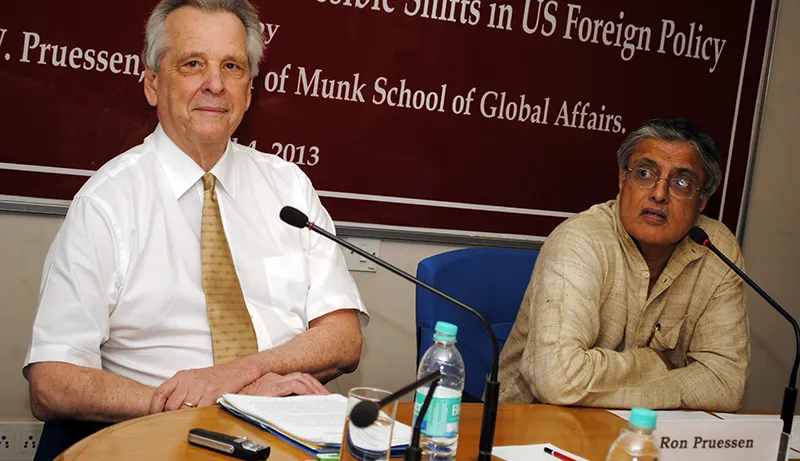-
CENTRES
Progammes & Centres
Location
Obama's China policy, motivated by an increasing level of interdependence, will involve constructive engagement with China. However, simultaneously, the US will also seek to ensure that their image of being a great power in Pacific-Asia does not change, according to US scholar Prof. Ronald W. Pruessen.

We must take into account the perils of prediction when considering possible shifts in US foreign policy in President Barack Obama’s second term, according to Prof. Ronald W. Pruessen, Director for International Partnerships & Research at the Munk School of Global Affairs at the University of Toronto
Participating in a conference organised by Observer Research Foundation on April 4, 2013, Prof. Pruessen said it is difficult to feel confident when assessing how the next four years will play out. The unreliability of economic prediction coupled with endless political and social variables entails that any effort to predict possible foreign policy shifts in Obama’s second term. Despite these concerns, Professor Pruessen gave several insights into what to expect.
Although it is possible to have dramatic shifts in foreign policy, as witnessed in the aftermath of 9/11 in the Bush presidency, according to Prof. Pruessen, we are unlikely to see any such shifts in the coming years. Obama’s first term took foreign policy in a number of different directions. So consistency in this sense should not be confused with inertia or stagnation. The President’s February State of the Union Address indicated that he would like to see a country that is not perpetually at war and where government plays an expansive role.
It is also likely that Obama will continue to take a carefully balanced approach towards China, Prof. Pruessen said. This is grounded on the perception, that among several other important relationships, this is perhaps the most significant one.
On the one hand, Obama’s policy, motivated by an increasing level of interdependence, will involve constructive engagement with China. Annual meetings on strategic and economic issues will continue. However, simultaneously, the US will also seek to ensure that their image of being a great power in Pacific-Asia does not change. It is likely that old relationships with China’s neighbours, such as Japan, Korea and Taiwan will deepen, to remind China of America’s presence. On China’s other border, it also possible that America will seek to maintain a pervasive presence in Afghanistan.
According to Professor Pruessen, the Bush Presidency did tremendous damage to America. Obama’s goals in 2007 were to repair and reinvigorate the country. This included ending the war in Iraq in addition to changing the approach towards the War on Terror. In order to refurbish the tarnished image of the US in the global arena, Obama stressed that it must reset its relationship with Russia, reach out to the Muslim world and seriously engage concerns related to climate change.
Although the US’ economy has shown signs of improvement, it is a long way from real vitality, Prof. Pruessen pointed out. The national debt stands at a staggering $16 trillion. Obama has been astute to recognise that the US cannot afford another trillion dollar war. His decisions to use cost effective tools, such as drones, have reflected his recognition of the fact that America is not the hegemon it was following the end of the Second World War.
Prof. Pruessen said Obama’s emphasis on utilising multilateralism as a platform, as opposed to taking unilateral action, also demonstrates the US’ declining influence. Obama has on numerous occasions stressed the importance of nation building. He would like to place emphasis on education, job creation and trade expansion to further their economic recovery.
In assessing strengths and weaknesses, Prof. Pruessen believes that the President has demonstrated stellar diplomatic skills. This has been witnessed by his success in facilitating the rapprochement between Turkey and Israel on his first foreign visit in his second term. America can also continue to benefit from its soft power - technological creativity, American pop culture and the attraction of American universities are all factors that can contribute to the revitalisation of the American economy.
However, the American state is plagued by a genuinely dysfunctional system and a troubled economy which is rife with inequities, Prof. Pruessen said. Obama too is not without his weaknesses, it has become abundantly clear that many of his supporters viewed his first term as a disappointment. This may be due to his inability to turn his passionate rhetoric into actions. He has therefore been accused of intellectual brinkmanship, where he has the ability to see out the terrain of serious problems, designate the solutions, but then not take most effective course of action.
When questioned about posting the Sino-American relationship to be that of a status quo power versus a revisionary power, necessitating that the relationship must become adversarial, Prof. Pruessen agreed that inevitably this must become a fractious relationship. But he also stressed that that decision making for actors is greatly determined by the arena in which they are acting. Current trends show that China is not acting as a traditional great power. However, he stated that the rise of Chinese nationalism is a worrying prospect, which may result in more aggressive behaviour. He was also questioned regarding America’s soft power, which according to some has been greatly dented by its actions in the West Asia. Whereas Prof. Pruessen agreed that American soft power is weaker, he is struck by its stamina and availability.
(This report is prepared by Kartikeya Khanna, Research Assistant, Observer Research Foundation, Delhi)
The views expressed above belong to the author(s). ORF research and analyses now available on Telegram! Click here to access our curated content — blogs, longforms and interviews.